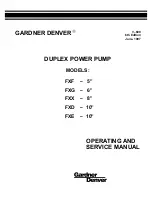
USING FUEL FILTER WITH PUMP
This pump is designed for use with a Fuel Filter.
This can be done by connecting the pump outlet direct to the Fuel Filter, using a straight steel extn.
Note:
Pump outlet is threaded ¾” BSPT (F)
5. Tighten the suction tube onto the pump inlet. It is good practice to use a sealant such as Teflon in connecting
the suction tube to the pump inlet
6. Insert the pump assembly into the drum from the 2” bung opening on the drum
7. Once the bottom of the suction tube touches the base of the drum, securely fasten the bung onto the drum.
Now tighten the bung onto the suction tube
8. When using the pump for the first time or after an extended period of time or using the pump to lift Fuels/ Low
Viscosity Media; make sure to
Prime
before use. To Prime,
POUR 30 ML OF MEDIA BEING PUMPED/ OIL
INTO THE PUMP OUTLET. RAPIDLY ROTATE THE PUMP HANDLE TILL PUMP STARTS DISPENSING.
In
everyday use ,it may take about 10 rotations of the crank for pump to start dispensing
9 . When not in use, you may chose to lock the pump using a padlock. Crank has a link under it which fits onto
the Lock Latch on the pump body.
10. For Pump Models supplied with hose assembly, you may use the nozzle holder, located adjascent the crank
& crank shaft connection to store the hose when not in use
CAUTION:
No
smoking
Safety gloves
must be worn
Wear your
safety glasses
Safety overalls
must be worn
1. Use of this equipment to pump fluids other than approved will void the manufacturing warranty
2. Never open the pump Assembly.
3. This pump is NOT U/L approved. If local laws do not allow for Fuels to be pumped using Non U/L approved pumps; you must
not use this pump for dispensing fuel.
4. This is a Rapid Action Pump & dispenses very large amount of media with each rotation. Be careful not to over dispense. It is also
recommended to lock the crank when not in use, as even slight un-intentional rotation will cause a lot of discharge
5. Never operate the pump near fire or source of spark. Some Media may be Explosive & Hazardous
6. Pump should only be used in well-ventilated areas. Never fill containers in confined areas, e.g. inside a vehicle. Do not operate pump in
areas where vapours can accumulate
7. Precautions are necessary to minimize the build-up of static charge, which could cause sparking
8. Always use Genuine anti-static hose when pumping petrol and other flammable liquids.
9. Fuel storage tanks and drums should be metal and grounded to earth. Ensure the floor or ground where fuel is stored or dispensed is
and remains electrically conducive
10. Wear anti-static or conductive footwear and avoid wearing silk and/or synthetic clothing, unless treated with anti-static solution
11. Avoid prolonged skin contact with petroleum products. Use of protective goggles, gloves and aprons is recommended in case of
accidental splashing or spillage. Change
clothing and wash skin contact areas promptly with soap and water
12. When carrying out maintenance of this pump, for your own protection, thoroughly drain the pump and hose before disassembly. Clean
flammable liquids from components
as they are removed from the pump. Follow precautions when handling flammable liquids
TROUBLESHOOTING
Pump does not dispense fluid
PROBLEM
CAUSES
REMEDY
Sr. Nr
1.
1.Pump not able to create adequate suction
2.Pump is drawing in air instead of fluid
3. Crank is not connected to crank shaft
1. Prime pump. Follow Step 9 above
2. Tighten all connections of suction tube
& of the suction tube with pump inlet
3. Loosen the grub screw on the crank.
Now align it with the depression on the
crank shaft & then tighten
Leakage of media from the
crankshaft
2.
Damaged seal due to use with media
not suitable for use with pump
Seal needs to be replaced. Send to
distributor for service repair
Leakage of media from between the
cover plate & pump body
3.
Damaged seal due to use with media
not suitable for use with pump
Seal needs to be replaced. Send to
distributor for service repair
S1240, Rev-D




















